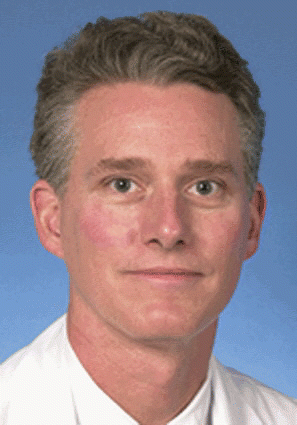In the secondary endpoint of voice quality, we measured maximum phonation time, fundamental frequency, phonation intensity, and range, he said. Overall, the differences were not significant (p = 0.54). Stroboscopic analysis of mucosal waveform showed no statistical difference (p = 0.72); and the GRBAS (grade, roughness, breathiness, asthenia, strain) scale showed no statistical significance (p = 0.64). Subjective voice evaluation-normal versus mild versus severe dysphonia-showed no statistical significant differences (p = 0.64).
Explore This Issue
October 2008 What he showed is that these two treatment modalities are equivalent. I think most people believe that. It would also be reassuring to doctors who use these modalities.
What he showed is that these two treatment modalities are equivalent. I think most people believe that. It would also be reassuring to doctors who use these modalities.-Mark C. Weissler, MD
We found trends favoring transoral laser surgery for improved local control, laryngectomy-free survival, and overall survival, but there was no significant difference in oncologic outcomes, Dr. Shah said. There was a trend favoring voice quality using external beam radiation.
Interpreting the Data
Mark C. Weissler, MD, the J.P. Riddle Distinguished Professor of Otolaryngology at the University of North Carolina- Chapel Hill, who moderated the session at which Dr. Shah delivered his paper, said, He tried to sort of make a case that surgical resection might be better, but it wasn’t supported by his data.
I think what he showed is that these two treatment modalities are equivalent. I think most people believe that. It would also be reassuring to doctors who use these modalities, said Dr. Weissler, who is also Chair of the UNC Clinical Cancer Advisory Committee and a clinical researcher at the Lineberger Comprehensive Cancer Center.
Dr. Shah acknowledged that his study was limited by few head-to-head comparisons, limited sample sizes, methodological issues of the studies, and poor correlation between objective and subjective measures.
There were no randomized clinical trial data, he said. The results were pooled analyses from retrospective studies. It was also limited by the duration of patient enrollment, as well as variability between studies regarding length of follow-up, tumor stage information, and staging criteria.
He said, however, that this study appears to be the first to compare the treatment modalities using meta-analytic techniques. We found oncologic control was most likely equivalent, and there was no clear difference in voice outcomes. Doctors should consider the potential morbidity of treatment and cost and utilization of health care resources and patient preference in considering which treatment would work best in each individual.
©2008 The Triological Society
Leave a Reply